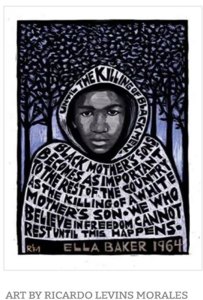[Democracy Now!] speaks with philosopher Olúfẹ́mi O. Táíwò, who has recently written two widely acclaimed books: “Elite Capture: How the Powerful Took Over Identity Politics (And Everything Else)” and “Reconsidering Reparations,” which focuses in part on the climate crisis.
Elite Capture: Philosopher Olúfẹ́mi O. Táíwò on How the Powerful Took Over Identity Politics
Democracy Now! January 18, 2023
TRANSCRIPT
AMY GOODMAN: This is Democracy Now!, democracynow.org, The War and Peace Report. I’m Amy Goodman, with Juan González, as we end today’s show with the philosopher Olúfẹ́mi O. Táíwò. He has recently written two widely acclaimed books: Elite Capture: How the Powerful Took Over Identity Politics (And Everything Else) and Reconsidering Reparations, which focuses in part on the climate crisis.
Robin D. G. Kelley, author of Freedom Dreams: The Black Radical Imagination, has said, quote, “Olúfẹ́mi O. Táíwò is a thinker on fire. He not only calls out empire for shrouding its bloodied hands in the cloth of magical thinking but calls on all of us to do the same. Elite capture, after all, is about turning oppression and its cure into a (neo)liberal commodity exchange where identities become capitalism’s latest currency rather than the grounds for revolutionary transformation.”
For more, we’re joined by Olúfẹ́mi O. Táíwò, associate professor of philosophy at Georgetown University.
We welcome you to Democracy Now!, Professor. Thanks so much for being with us. Why don’t we start off by you defining the term “elite capture”?
OLÚFẸ́MI O. TÁÍWÒ: Well, thanks a lot for having me.
The basic idea behind elite capture is kind of like the idea behind inequality. So, elite capture is what happens when the advantaged few in a group steer the resources and political direction of organizations or movements or parts of our social structure, like the justice system, towards their narrower interests and aims.
JUAN GONZÁLEZ: And could you talk about how that works in practice in day-to-day activities within Black and Brown communities especially?
OLÚFẸ́MI O. TÁÍWÒ: So, how this works in practice, I think, works a lot through the ways that we talk and communicate about politics and about what’s going on in our lives. I think there is often a discussion that is related to elite capture when people talk about the corporate control of media and the result on our kind of day-to-day discussions and day-to-day understanding of politics. So, when we have conversations about things like racial justice, or even justice with respect to class politics and the class struggle, and end up steering those conversations around the kinds of conversational topics that have to do with representation in elite spaces, whether we’re talking about universities or maybe media, like movies and film, and recognition for excellence in those kinds of aspects of life, that is the result, one could argue — I argue — of the disproportionate control of the institutions that control how we get information about politics on the day-to-day conversations that we have about politics.
JUAN GONZÁLEZ: Well, obviously, the Black Lives Matter movement and the upsurge of protest in recent years has led many of these institutions to basically create this whole new diversity, equity and inclusion industry, as I call it. I’m wondering your sense of how this attempt by the power structures to coopt these grassroots movements, how that has affected the way that especially the African American and Latino intelligentsia react to the DEI movement.
OLÚFẸ́MI O. TÁÍWÒ: I definitely think there is a big influence there. And on the one hand, I think the response of the powerful to try to coopt grassroots movements in this way kind of reflects a sort of political victory that was won. A hundred years ago, the powers that be weren’t trying to appear woke or weren’t championing diversity and inclusion. Explicit, formal segregation was the rule in the United States, in South Africa. And over time, as those systems got pressured by grassroots movements that opposed things like Jim Crow and apartheid, then you saw what you’re talking about, which was the rise of equity, diversity and inclusion initiatives and the use of the kind of energy generated by those movements to kind of wash or paint over the ongoing existence of structural racism and of capitalism and of the class injustices that are built into capitalism, but do it with, you know, a kind of rainbow coalition of faces in high places.
And the intelligentsia at universities, which is one of the sectors of society that has been affected by this, has definitely responded to the rise in equity, diversity and inclusion kind of corporate framings by focusing on optics rather than kind of the material struggles which caused the creation of ethnic studies programs in the first place, which caused the rise of the study of racial justice and gender justice and all the other sorts of things that get studied under the heading of what we would now think of as EDI.
AMY GOODMAN: Fẹ́mi, you talk about the Combahee River Collective and its relation to and framing of identity politics. Tell us what it is, once again — we’ve discussed it many times before — but how it frames identity politics, that you think are critical in this country.
OLÚFẸ́MI O. TÁÍWÒ: So, the Combahee River Collective was a collective of queer Black women socialists that organized in and around Boston in the 1970s and, of course, has — the members of the collective have continued to be involved in politics since. And they coined this term “identity politics” that now gets used a lot these days.
And as they thought of identity politics, or as they wrote about it in their manifesto, identity politics was essentially the drive to do politics starting from a first-personal basis. So, you look at your life and your political circumstances, and figure out your political priorities and work from there. That’s compatible with ending up in coalitional politics, which is in fact what many of the members of this coalition did, in fact, do.
But I think nowadays when people use the term “identity politics,” they’re thinking of the ways of talking about identity that circulate on social media, which are maybe more commonly hostile to coalitional politics, or at least suspicious about coalitional politics, and which seem to emphasize and encourage people kind of splitting up into smaller and smaller groups and only being willing to work with and advocate for people whose identities match theirs or most closely match the person who’s speaking. And that’s quite different from what I understand the point of the Combahee River Collective’s coining of the term “identity politics” to be.
JUAN GONZÁLEZ: In your book, you also talk about lessons that can be learned from the African struggle against colonialism, specifically in Cape Verde and in Guinea-Bissau against Portuguese colonialism in the 1960s and ’70s. Could you expound on that?
OLÚFẸ́MI O. TÁÍWÒ: Yes. So, the wars of independence that were fought throughout the African continent and the world beyond the African continent were linked. And the Bissau-Guinean and Cape Verdean struggle against the Portuguese Empire was one of these. They had to organize within themselves and across the groups that divided them and the groupings that divided them. That included divides between Bissau-Guineans and Cape Verdeans. That included divides on religious grounds and ethnic grounds between people.
And they had to organize, zooming out, across much larger divides. They were part a wave of African independence struggles that were organizing with each other through the Organization of African Unity, as it was called then, and across some of the new country lines. There was international support from countries like Bulgaria and Sweden and the Soviet Union, and Cuba even went as far as to send troops.
And all of these kinds of divisions, or potential divisions, were things that they had to be willing to work across to get their goal accomplished, which was defeating the Portuguese Empire, which was a NATO member state and had the material support of corporations like Lockheed Martin and countries like the United States. And they were ultimately successful in that struggle because they were willing to work across all of those kinds of factors of division.
AMY GOODMAN: Professor Táíwò, finally, in the minute we have left, a recent Grist interview described you as “One of America’s most prominent philosophers who argue that climate change calls us to rethink world history.” Can you lay out what you call the constructive view of reparations?
OLÚFẸ́MI O. TÁÍWÒ: Basically, what I mean by the constructive view of reparations is the idea that we do need the people who have gotten rich off the spoils of yesterday’s injustice, yesterday’s apartheid, yesterday’s laying of the groundwork for today’s capitalism, and there needs to be redistribution from the large corporations that have gotten all of that wealth to the rest of the people throughout the world.
But the point of that redistribution isn’t just so we can shuffle around cells on an Excel spreadsheet. I think we should also be building a different kind of world that doesn’t structurally run on racism and other kinds of oppression and capitalism. And the construction of constructive view is the point of building that world. That world would have a much different energy system. It would produce things in a different way. It would manage resources in a different and more democratic way. And I think those are the kinds of changes we have to think about building, rather than only thinking about redistributing money or only thinking about tearing down the structures that we have now.
AMY GOODMAN: Olúfẹ́mi O. Táíwò, we want to thank you so much for being with us, associate professor of philosophy at Georgetown University, author of, most recently, two books, the most recent, Elite Capture: How the Powerful Took Over Identity Politics (And Everything Else) and Reconsidering Reparations.
That does it for our show. Democracy Now! produced with Renée Feltz, Mike Burke, Deena Guzder, Messiah Rhodes, Nermeen Shaikh, María Taracena, Tami Woronoff, Charina Nadura, Sam Alcoff, Tey-Marie Astudillo, John Hamilton, Robby Karran, Hany Massoud. Our general manager, Julie Crosby. I’m Amy Goodman, with Juan González.
Olufemi Taiwo is an author and associate professor of philosophy at Georgetown University.
LINKS
- “Elite Capture. How the Powerful Took Over Identity Politics (And Everything Else)”
- “Reconsidering Reparations”
Independent media is essential in these Rise Up Times. Your support makes Rise Up Times, Media for Justice and Peace possible. Please donate today.



